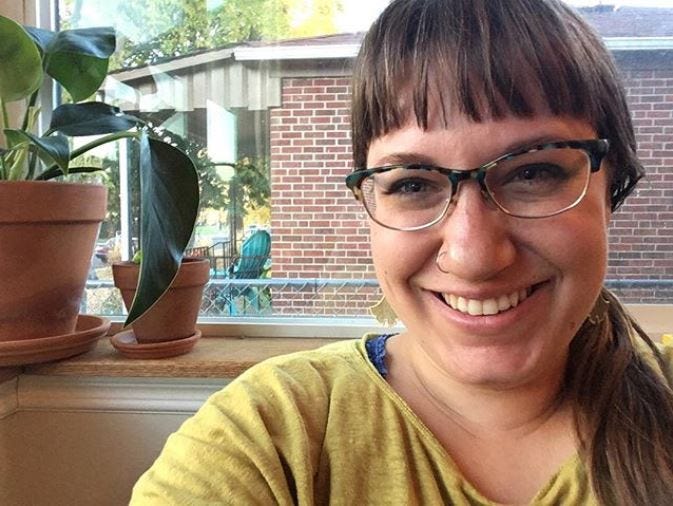the Empathy List #65: Church Is Not A Safe Place
What the Evangelical Church Never Taught Me, Part 5
A quick note before we jump in: I hope church was a safe place for you. I really do. But it isn’t for many, myself included. This essay is for us.
Hey friend, Liz here.
One day, in high school, my friend arrived home to find his mother in tears. A youth group leader—one that my friend himself had spent time with, gone to movies with, attended missions trips with—had admitted to sexually abusing kids in their church youth group. He turned himself in, and the elders called the cops.
I tell you this because I want you to understand that I have seen the underbelly of the Christian church.
I have interned in two separate churches, once for a youth pastor one summer during college at my parents’ east coast nondenominational megachurch, and once in my current hometown of Denver, Colorado for an Acts 29 mega-plant, when I was a 30-year-old wife and mom of two.
I spent the summer internship adrift among teens, flirting with a fellow youth leader, handing out Oreos to any middle school girl whose mother dropped her at our “cookie & convo” church meeting, where I puffed out my chest and told the teens I wanted to be a “theologian” and then prayed for any girls who sliced at their wrists between class periods.
The youth pastor, only 29 himself, spent what seemed the majority of his time on MySpace, messaging his soon to be wife (and then ex-wife). He offered edgy sermons from a six-inch tall stage that pointed out how hard it was for him, being a 29-year-old virgin, but if he could wait, then so could they, the hormonal suburban teens sitting cross-legged beneath him, most of whom were so overparented that they wouldn’t have been able to manage anything more than car sex anyway.
We had no staff meetings, no goals, no presence from our depressed youth group leader, and it showed. The youth group sank like a stone.
The second internship, I spent 15 hours a week for a whole year sitting across from the saddest cases, the almost-divorcees and the still-addicteds, listening to their woes and offering condolences and practical help (Do you need a babysitter? Can we bring you a meal? Can I set up an appointment with this therapist?).
The other 5 hours I worked at the church were spent at contentious staff meetings where I understood that I was a barely tolerated presence and where I was determined to make myself indispensable despite that.
Absence is one thing. But competitive aggression? After having been barely noticed as an intern during the first go-around, this time, I was asked not to speak up in meetings, to keep my feelings to myself, to stay in my place (at the bottom).
The leading pastors and elders were all male, all white, and master micro-aggressors. When I cried, they scoffed; when I misspoke, they corrected me; when I asked questions, they talked over me; when I asked for a paid 10-hour-a-week job after the internship concluded, in order to continue my work with the congregants on the outskirts, they told me “it wasn’t a priority.” (And no, they assured me, it wasn’t about the money ;“we have the money,” they said.)
The ministry I’d poured myself for 20 hours a week, without pay, for a whole year, that ministry into wasn’t the priority. In that moment, I felt that I wasn’t the priority—not just to those leaders, but to God.
I tell you this because I want you to understand that I have known the underbelly of the Christian church.
A friend I know was regularly looked up and down by her pastor, who would comment in front of her husband and other church staff members on whether she looked slim enough (to his standards) or needed to lose weight.
A memoirist I know wrote two books, in which she admitted to an almost-affair and an alcohol dependency. After publication, the elders at her church quoted passages from her books in front of the congregation in order to justify evicting her and her family from their midst. (No second chances.)
Another friend experienced repeated marital rape and psychological abuse from her husband, and the pastors told her that divorce was still unbiblical.
Another had just barely escaped her marriage to her violent husband when a church lady in her small group told her that she should invite him to the upcoming potluck so that, fingers crossed, they could finally work it out and get back together, like God wanted.
I tell you this because I know that you have also experienced the underbelly of the Christian church.
The Christian church has been implicated in sex scandal coverups (as in Ravi Zacharias’ case), homosexual conversion camps, the KKK with their cross-burning, and conning their congregants.
Is it any wonder that church isn’t a place of emotional safety for many of us? That we sit on the edge of our seat during sermons, waiting for the barb that is surely on the tip of the preacher’s tongue? That we hesitate before volunteering or joining a small group? That we reject offers for those across the pew to pray with us?
Spiritual abuse is a relatively new name for an old phenomenon that anybody who’s ever occupied a pew knows well.
Of course, church isn’t always the perpetrator. In the best case scenario, church is a functional family. Jesus’s vision of Christianity was never an event, an institution, a movement, a political party, a cult following the leader, or a clique of cool kids. Church is a relationship, or rather, a collection of relationships.
This originates from the trinity’s own interconnected, distinct and personal three-in-one intimacy. That invitation to wholeness and unity and interconnectedness is extended also to us, new members of God’s household.
To us, Jesus says, what’s mine is yours, because you are as important to me as the members of my own nuclear family.
You are as important to me as myself.
When church goes bad, it’s toxic waste, a radioactive battlefield, a smoking pool of shit. But it’s not always clear cut whether your church or my church is a fully rotted apple or one with a few worms. (Listen to the podcast below in #1, debriefing Scot McKnight’s experience with Bill Hybels to identify where your church may fall on this functionality spectrum.)
But in a functional family, members are embraced despite sometimes holding opposing beliefs. A functional family listens well, ask questions, and seeks each other’s best. A functional family finds ways to be generous toward the other. A functional family welcomes saying “no,” changing your mind, and saying sorry. A functional family models forgiveness and vulnerability and respect. A functional family sees each member as valuable and needed, each a celebrated addition that helps the whole to stay healthy.
To receive care within a functioning family is to receive Christ’s care for me from your hands.
I have much more to say about family (the family metaphor can be problematic simply because many of our families doubled as our abusers), but for now, I want to leave you with this: the vision of church that Christ models for us is not one that arrests power and claims authority; it is not a calendar event; and it is not a group of people who look/act/believe exactly like you.
Church is the people who risk vulnerability, who admit to being wrong, who forgive each other freely, and who do not demand enmeshment, but offer individuated, interdependent belonging instead.
Only then can church ever be “safe” for any of us.
This email is the 5th in a series in which I have been exploring skillsets & theologies the Evangelical church never taught me.
This will be the last in the series for a while, most likely to be picked up again in August. Or September. (No, YOU’RE indecisive.)
As I’ve written before, I grew up Evangelical: from my baby dedication, to church summer camp, to youth group, to Christian high school and college… the list goes on.
I call myself a liberal Evangelical these days. And I’m speaking to my people—us Evangelicals. We need to change, starting yesterday. We can do it, together, with humility and tenderness. I want to push you forward on that journey, my friend.
Also: for the first time, I have turned on a subscription option for this newsletter. If you sign up at $50/year, I will do a spiritual memoir book club with you (and anyone else who signs up) via Zoom.
Or you can subscribe for $3/month, which I’m pretty sure works out to $2 to me. That’s 50 cents per email! (Remind me why I’m not babysitting for cash instead of writing??)
ALL my emails will continue to be FREE for everyone, which means the paid option is simply a way for you to say thanks for the 6-8 hours I spend weekly to write and curate this content. ;-)
If you cannot afford to pay for this email, I get it! In lieu of cash, would you consider sharing this email as a FREE way to say thanks instead?
As always, thanks for reading along. It is a joy to learn from and share with you. You’re the reason I write. ;-)
Warmly, Liz Charlotte Grant
#1
Is your church culture toxic?
Pastor Scot McKnight explores the aftermath of Bill Hybels’ 2018 scandal and how Willow Creek initially covered it up.
the Holy Post podcast | Listen…
#2
Watch the Surrealist artist Salvador Dali and Walt Disney’s collaboration on 6-minute animated film.
“The six-minute short follows the love story of Chronos and the ill-fated love he has for a mortal woman named Dahlia. The story continues as Dahlia dances through surreal scenery inspired by Dalí's paintings. There is no dialogue, but the soundtrack includes music by the Mexican composer Armando Dominguez. The 17-second original footage that is included in the finished product is the segment with the two tortoises.” (Description by Delectant)
#3
The Pentagon says UFOs are real.
(Still no word on the “alien” question, but there are Unidentified Flying Objects that we’re worried about, apparently. Watch the 2019 video for yourself to see what you think.)
The New Yorker | Read more…
#4
The story of how white evangelicalism made grammy-winning rapper, Lecrae, pick a political side—and then kicked him out when he chose wrong.
“Subconsciously, you think that ‘white is right,’ because the neighborhoods that look the nicest are white. The people who own the basketball teams are white. And so, clearly, the people who are talking to me and telling me about theology, if they’re white, then they must be right. And that was a subconscious idea that I had.”
The Atlantic’s The Experiment Podcast | Listen...
#5
Young American Jews are changing their minds about Israel, as the perennial conflict between Israel and Palestine entered a cease-fire.
“I was raised to unequivocally support Israel. As a second-generation American Jew and granddaughter of a Holocaust survivor, I never questioned Israel’s existence, actions, and connection to the United States — not because debate wasn’t encouraged in my house, but because I never even thought to ask.”
Rolling Stone | Read more…
Just for Fun
Product placement fail OR effective way to get us to go back to the movie theater?
(It just keeps going… and going…)
P.S. Follow me elsewhere on my website, Facebook and Instagram. You’re the best.







